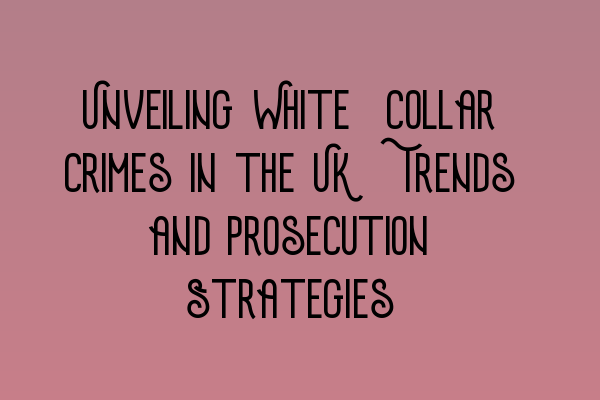Unveiling White-Collar Crimes in the UK: Trends and Prosecution Strategies
White-collar crimes have been on the rise in recent years, posing significant challenges to law enforcement agencies and the legal system. These crimes, typically committed by individuals in positions of power or authority, involve non-violent offenses that are financially motivated.
Trends in White-Collar Crimes
Understanding the latest trends in white-collar crimes is crucial for legal professionals and society as a whole. The evolving nature of these crimes demands constant adaptation and innovative prosecution strategies.
1. Cybercrimes
With the increasing reliance on technology and the internet, cybercrimes have become a prominent aspect of white-collar criminal activity. From data breaches and identity theft to online fraud and hacking, cybercrimes require highly specialized skills to investigate and prosecute effectively. To gain a deeper understanding of cybercrimes and their implications, take a look at our related article on SQE 1 Practice Exam Questions.
2. Financial Fraud
Financial fraud schemes, such as Ponzi schemes, insider trading, and accounting fraud, continue to plague the business world. These crimes often involve complex financial transactions and require meticulous analysis of financial records. To enhance your knowledge of financial fraud and its detection, check out our article on SQE 1 Practice Mocks FLK1 FLK2.
3. Bribery and Corruption
Bribery and corruption remain significant issues globally, affecting both public and private sectors. The UK has implemented robust legislation, such as the Bribery Act 2010, to tackle these crimes. Understanding the intricacies of bribery and corruption law is essential for successful prosecution. To explore further on this topic, consider our comprehensive SQE 2 Preparation Courses.
Prosecution Strategies
The prosecution of white-collar crimes requires a strategic approach to gather evidence and present a compelling case. Here are a few key strategies that can aid in successful prosecutions:
- Financial Analysis: Conducting in-depth financial analysis is crucial to uncover fraudulent activities and trace the money trail. Analyzing bank records, financial statements, and transactions can provide critical evidence in white-collar crime cases.
- Forensic Accounting: Forensic accountants play a pivotal role in uncovering financial irregularities and providing expert testimony. Their expertise in financial investigations can significantly contribute to securing convictions in white-collar crime cases.
- Cooperation with Regulatory Bodies: Collaborating closely with regulatory bodies, such as the Financial Conduct Authority (FCA) and the Serious Fraud Office (SFO), can facilitate investigations and support the legal process. Engaging in information-sharing and joint efforts can enhance the overall effectiveness of prosecutions.
- Whistleblower Protection: Providing protection and incentives for whistleblowers is crucial in detecting and prosecuting white-collar crimes. Encouraging individuals to come forward with valuable information can strengthen the case against perpetrators and dismantle intricate criminal schemes.
To further enhance your understanding of white-collar crimes and prosecution strategies, our SQE 1 Preparation Courses offer comprehensive materials and resources.
Stay Informed and Contribute to a Safer Society
As white-collar crimes continue to evolve, it is imperative for legal professionals to stay updated with the latest trends and prosecution strategies. By doing so, they can actively contribute to a safer and more accountable society.
For upcoming SRA SQE exam dates and more valuable insights, refer to our article on SRA SQE Exam Dates.
